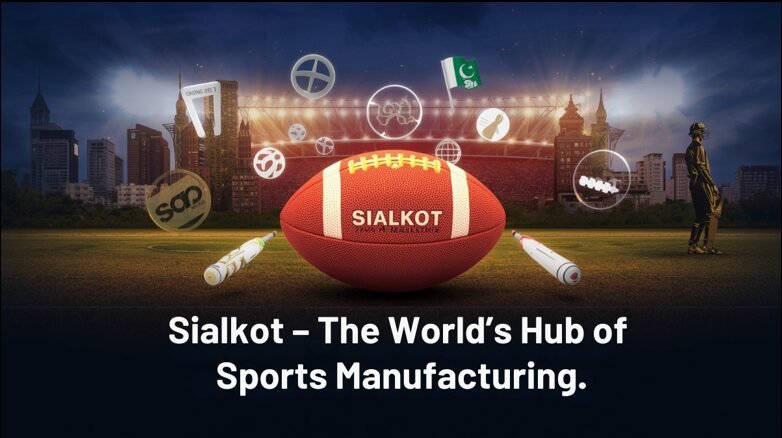Introduction
Sialkot, Pakistan, is not just another industrial city — it is a global manufacturing powerhouse. Famous worldwide for its sports goods, surgical instruments, and leather products, Sialkot has built a reputation as the world’s leading hub of sports manufacturing. From supplying footballs for the FIFA World Cup to producing gear for top brands like Adidas, Nike, and Puma, Sialkot has become a symbol of quality, craftsmanship, and global impact.
In this article, we’ll explore why Sialkot is recognized as the sports capital of the world, its contributions to Pakistan’s economy, its unique craftsmanship, and the opportunities and challenges it faces in the global market.
Global Recognition of Sialkot
- FIFA World Cup Footballs: Sialkot gained worldwide fame when it was revealed that the official footballs of FIFA World Cups were made here. The city has become synonymous with football manufacturing excellence.
- Supplying Global Brands: Beyond footballs, Sialkot’s factories supply leading sports brands like Adidas, Nike, Puma, and Decathlon. Whether it’s cricket bats, hockey sticks, gloves, or protective gear — chances are, much of it was crafted in Sialkot.
👉 Why it matters: This global recognition positions Pakistan as a trusted supplier in international markets and highlights the city’s ability to meet world-class standards.
Economic Contribution to Pakistan
- Export Powerhouse: Sialkot contributes billions of dollars annually to Pakistan’s exports, making it one of the biggest drivers of the national economy.
- Employment Generation: The sports manufacturing industry in Sialkot provides jobs for hundreds of thousands of skilled and semi-skilled workers, supporting countless families.
- Private Sector Initiative: Interestingly, Sialkot’s industrialists even built Pakistan’s first privately owned international airport, proving the strength of its business community.
👉 Why it matters: Sialkot is a shining example of how entrepreneurship and industrial innovation can uplift an entire region.
Craftsmanship & Innovation
- Handmade Excellence: Sialkot is renowned for its hand-stitched footballs and other sports equipment, blending tradition with global demand.
- Modern Technology: While preserving traditional skills, factories have also adopted machine-stitching, 3D printing, and automation to meet large-scale production needs.
- Quality Control: Strict quality checks ensure that products meet international sports standards and certifications.
👉 Why it matters: This unique balance of heritage craftsmanship and modern innovation sets Sialkot apart from other manufacturing hubs.
Challenges & Opportunities
Despite its achievements, Sialkot faces several hurdles:
- Challenges:
- Energy shortages and rising production costs.
- Competition from cheaper markets like China and Vietnam.
- Limited global branding under “Made in Pakistan.”
- Opportunities:
- Expanding into e-commerce and direct-to-consumer exports.
- Investing in renewable energy to reduce costs.
- Building stronger international branding campaigns to highlight Sialkot’s legacy.
👉 Why it matters: If these challenges are addressed, Sialkot can double its global share in the sports manufacturing industry.
Conclusion
Sialkot is more than a city — it is Pakistan’s industrial pride and a global icon of craftsmanship. From small local workshops to supplying the world’s largest stadiums, Sialkot has proven its strength in quality, skill, and resilience.
As the world’s hub of sports manufacturing, Sialkot continues to shine on the international stage, carrying forward Pakistan’s name with every football kicked, cricket bat swung, and pair of gloves worn.




